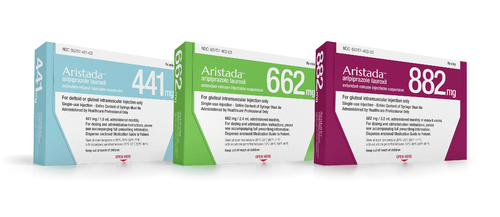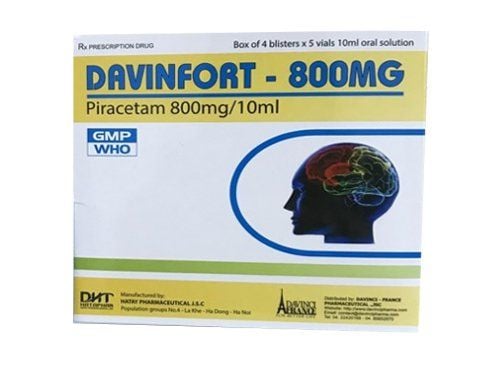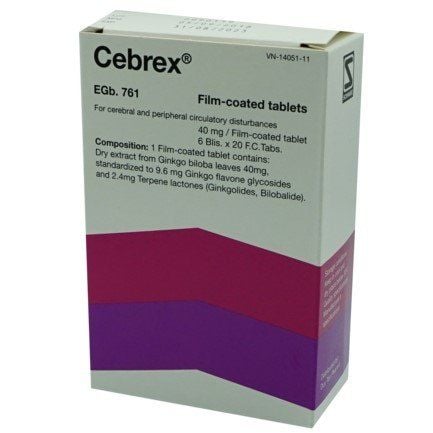This is an automatically translated article.
Ramcamine is used to treat neurological problems. When using the drug, the patient should be very careful and strictly follow the instructions of the doctor. Here are some shared information to help you better understand what Ramcamine does.
1. Uses of the drug Ramcamine
What effect does Ramcamine have? Ramcamine is a psychotropic product designed to treat medical problems in the circulatory system of patients. You may be prescribed the use of Ramcamin when you have the following medical conditions:
Memory impairment Increase patient concentration Support to improve vascular health Each specific patient condition will have specific indications. There are different indications for the use of Ramcamine. Patients should not arbitrarily use drugs in the group of psychotropic drugs without the permission of the doctor. In addition, the effects are indirect, you need to consult a doctor to understand and understand how to use them correctly.
Cases where the doctor prescribes Ramcamine to use drugs that are not within the scope of indications should be considered. Patients can ask for specific support about drug properties for specific medical conditions.
2. Dosage and how to use Ramcamine
Ramcamine is a drug used orally that does not affect when the patient takes it at any time. You can use it whenever you see fit. However, the advice is always preferred to take the drug after meals to avoid affecting the stomach.
The dose of Ramcamine will be adjusted to best suit the patient. For patients with dangerous syndromes at risk of reacting to Ramcamine, it is necessary to consult a doctor to be prescribed the right dose at the right dose.
Ramcamine is not indicated for use in children under 18 years of age. This age group should only use Ramcamine when absolutely necessary or no other treatment options are available. For adults, when taking Ramcamine, please inform your doctor for instructions on how to use the drug in the most appropriate way. Adults should take 3 times a day and take 1 pill each time.
The phenomenon of overdose or missed dose will cause serious effects for patients using drugs in the treatment of mental illness. This is a sensitive group of drugs that interact with nervous system health. Therefore, always try to remember the prescribed time and dose for each dose.
3. Notes before taking Ramcamine
Before taking Ramcamine, patients need to assess the risk of drug allergy. Any documented allergic problems require specific evaluation. When determining that the patient is allergic to Ramcamine or its ingredients, it is necessary to change the drug with the same effect or have another treatment plan to limit irritation and reduce the danger to the patient.
People with a history of myocardial infarction will easily lead to sequelae of arrhythmia. This sequelae seriously affects the health of patients when using Ramcamine. Therefore, this subject needs to use the lowest dose and gradually increase until it feels suitable and the body does not have serious effects. During the course of treatment, the patient should be monitored and examined, especially electrocardiogram.
Patients with disturbances in blood potassium levels should also pay attention to stabilizing this index while using Ramcamine. Ramcamine, when used for a long time, will not have specific treatment for the patient's blood pressure. In addition, women and children should be very careful to research carefully before taking Ramcamine.
4. Ramcamine side effects
Ramcamine is a prescription drug with a doctor's supervision, so it is quite rare to have dangerous side effects. That is not to say that the use of the drug is absolutely safe. If the patient actively follows the instructions and has monitoring, it will somewhat limit dangerous side effects. The rest is caused by the patient's health and physical condition.
Although it is very rare that side effects appear in patients taking Ramcamine, it does not mean that patients can be subjective. Please pay special attention to symptoms such as headache, digestive system dysfunction, itchy rash, ... to report to your doctor and get advice and support when necessary.
5. Interactions with Ramcamine drugs
Ramcamine drugs appear to interact causing torsades de pointes in some drug groups such as: Bepridil, Amiodarone, Disopyramide, Bretylium, Intravenous drugs, Erythromycin, Sotalol, quinidine group drugs, Sultopride. In addition, it should be noted to avoid taking drugs that affect blood potassium levels such as potassium-lowering diuretics, laxative stimulants. The situation of interactions when these drug classes are randomly combined can increase the level of danger if the patient's heart rate shows signs of slowing down.
It is necessary to avoid the use of drugs that affect the heart rate during treatment with Ramcamine. Non-stimulant laxatives can be used to reduce interactions when necessary. With the group of drugs causing torsade de pointes cannot be combined, it is recommended to switch to clinical research methods or electrocardiograms to facilitate specific monitoring of the patient's condition.
Above are the shares to help readers better understand what Ramcamin drug has. If you have any questions, you can contact your doctor for advice and support.
Follow Vinmec International General Hospital website to get more health, nutrition and beauty information to protect the health of yourself and your loved ones in your family.













